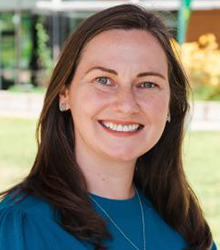
Elizabeth Budd
Biography
Dr. Budd will be accepting new PhD students in Prevention Science, but will not be accepting new PhD students in Counseling Psychology for the 2026-2027 academic year.
Dr. Liz Budd (she/her/hers) is an Evergreen Associate Professor situated within the College of Education, Counseling Psychology and Human Services Department, and affiliated with the Family and Human Services and Prevention Science programs. Dr. Budd is also a member of the Health Promotion Initiative and Prevention Science Institute. Nationally, Dr. Budd holds leadership roles in the Physical Activity Section of the American Public Health Association.
Dr. Budd’s teaching and research interests are centrally located in the field of public health, but are transdisciplinary in nature, reflective of her training. The goal of her research is to prevent the onset of chronic diseases, especially among groups with heightened risk, to achieve population-level health equity. Specifically, she examines the policies and environmental factors (social and physical) that influence physical activity and eating habits. She has a particular interest in youth, adolescent girls, and Latino/a/e/x communities. Dr. Budd also works to implement, evaluate, and foster the sustainability of evidence-based interventions to promote healthy behaviors in community settings.
Dr. Budd enjoys weaving her research into her teaching of Contemporary Issues in Public Health and Transdisciplinary Problem-Solving in Public Health, often employing standing ovations and other physical activity breaks throughout class. Dr. Budd grew up in Oregon, but completed most of her training in St. Louis, Missouri. She encourages undergraduate and graduate students to reach out to her if they are interested in gaining research experience.
I am committed to inclusive research and teaching. The ultimate goal of my research is to move us closer to the elimination of health disparities. For example, some of my recent collaborative research has involved developing and disseminating a training to reduce body size bias and discrimination in workplace settings and to reduce body size bias internalization. Related to teaching, my undergraduate and graduate public health courses aim to prepare students to work alongside community members in assessing and addressing priority community health problems to advance health equity. As a mentor, I use a team-based approach to support our academic, professional, and emotional development through our unique but interconnected learning journeys. For instance, my research team meets bi-monthly to share project updates, exchange feedback, and encourage each other. To that end, my research team and I love working with McNair Scholars and aim to advise 1-2 scholars each year. My transdisciplinary, collaborative approach to research, teaching, and mentorship reflects my belief that we are more effective at problem-solving when we strive to understand diverse perspectives and work together toward a common goal.
Or read more about Elizabeth Budd
Education
PhD, 2016, Washington University in St. Louis, Brown School of Social Work and Public Health, St. Louis, MO
Major: Social Work with a Public Health focus
MPH, 2009, St. Louis University, College for Public Health and Social Justice, St. Louis, MO
Major: Behavioral Science and Health Education
BS, 2005, Santa Clara University, Santa Clara, CA
Majors: Sociology and Spanish Studies
Publications
Select Publications:
Budd, E. L., De Anda, S., Halvorson, S., Leve, L. D., Mauricio, A. M., McWhirter, E. H., … & DeGarmo, D. S. (2025). Social determinants of health associated with SARS-CoV-2 testing and vaccine attitudes in a cross-sectional study of Latinx individuals in Oregon. American Journal of Preventive Medicine FOCUS. 4(3), 100326. https://doi.org/10.1016/j.focus.2025.100326.
Budd, E. L., Castro, E., Terral, H. F., Farley, Z. S., & Kelly, N. R. (2024). Systematic review of the evidence on physical activity prescriptions for youth. Preventive Medicine. 189(108145). https://doi.org/10.1016/j.ypmed.2024.108145.
Kelly, N. R., Osa, M. L., Luther, G., Guidinger, C., Folger, A., Williamson, G., Esquivel, J., & Budd, E. L. (2024). Preliminary evaluation of a brief worksite intervention to reduce weight stigma and weight bias internalization. Evaluation and Program Planning. 104(102434). https://doi.org/10.1016/j.evalprogplan.2024.102434.
Budd, E. L., McWhirter, E. H., De Anda, S., Mauricio, A. M., Mueller, M., Cioffi, C. C., …& Leve, L. D. (2022). Development and Design of a Culturally Tailored Intervention to Address COVID-19 Disparities Among Latinx Communities Across Oregon. Frontiers in Public Health, 10(962862), eCollection 2022. http:doi:10.3389/fpubh.2022.962862.
Budd, E. L., Giuliani, N. R., & Kelly, N. R. (2021). Perceived neighborhood safety moderates the association between racial discrimination stress and chronic health conditions among Hispanic/Latino adults. Frontiers in Public Health, 9(585157). https://doi:10.3389/fpubh.2021.585157.
Budd, E. L., Franz, D. J., Kelly, N. R., & Giuliani, N. R. (2020). Oregon parents’ perceptions of the supportiveness of the school environment for their children’s health behaviors. Journal of Nutrition Education and Behavior, S1499-4046(20), 30056-7. https://doi.org/10.1016/j.jneb.2020.02.004
Budd, E. L., Liévanos, R. S., & Amidon, B. (2020). Open campus policies: How built, food, social, and organizational environments matter for Oregon public high school students. International Journal of Environmental Research and Public Health, 17(2), 469. https://doi.org/10.3390/ijerph17020469
Research
Approximately, 88% of deaths in the United States can be attributed to chronic diseases, such as type 2 diabetes and heart disease. The odds of developing a chronic disease are primarily determined by a combination of one’s genetics, health behaviors, and characteristics of the environments in which people live. Dr. Budd examines the 1) policies and 2) environmental factors that influence physical activity and eating, primarily among youth and Latinx communities; and 3) investigates factors associated with the dissemination and implementation of evidence-based interventions to prevent chronic diseases and promote population-level health equity.
